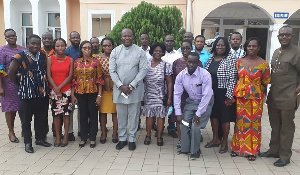Regional News of Friday, 2 October 2020
Source: GNA
HealthyFoodsAfrica engages stakeholders on fishing processing and packaging
HealthyFoodsAfrica has engaged stakeholders in the food processing industry to develop and update them on relevant innovative food processing, preservation, and packaging.
The stakeholders would also brainstorm on how to design improved smoking and preservation technology for fish processing to avoid carcinogens in the end product for consumers.
Experts from the Council for Scientic and Industrial Research (CSIR), the Fisheries Commission, Ghana Standards Authority (GSA), University of Ghana (UG), Chefs Association, and Fish Processing Association participated in the engagement.
Dr Seth Agyarkwa of the CSIR, who threw more light on the workshop, said the main objective of the project was to look at how food and fish should be produced sustainably and efficiently to mitigate climate change impact.
For instance, he mentioned that the project would discuss ways of improving the preservation and packaging of 'koobi' and 'momoni' and anchovies popular food delicacies, and the smoking method which comes with huge health burdens.
Dr Agyarkwa explained that ways to improve the preservation of these fishes to other than using so much salt which had health implications as well as it's packaging would be dealt with.
HealthyFoodsAfrica aims to increase food resilience systems and to link food production to nutrition and healthy methods, through the creation of innovative technologies and practices as well as governance arrangements.
The project is being implemented in six countries in Africa including Uganda, Benin, Zambia, Kenya, Ethiopia, and Ghana to improve indigenous foods/fishes consumption as well as markets.
In Ghana, HealthyFoodsAfrica is collaborating with CSIR and others using Food Systems Labs, a coined term for selected communities for the implementation.
Amy Atter, Senior Research Officer at CSIR and principal investigator for the project, said in other not to replicate any technology, the engagement sought to disclose already existing technologies and how best to incorporate it for adaptation by stakeholders.
Entertainment










